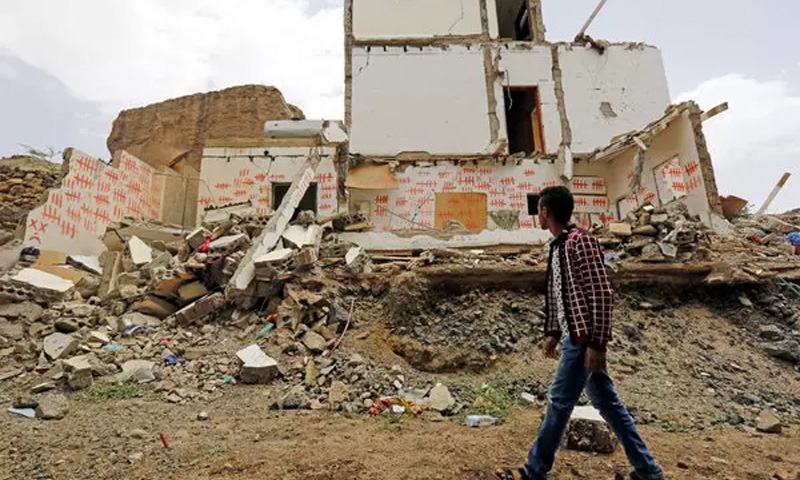Yemen’s worsening humanitarian crisis
On a recent evening, Ali Al Hajori, a man in his 60s, was begging on 70th Square in the western part of Sana, the capital of Yemen. Hajori, whose lips were parched, would stop by each car pulling over at a public park and raise his right hand in an appeal for help. As the sun set over the war-torn country, Hajori walked back to a rented room, where he lived with his family, who have been starving.
About three years earlier, after intense civil war, Hajori fled his home in Mahwit province, 75 miles northwest of Sana. He used to work as a farmer and picked up jobs in construction with his son to supplement their income.
He was also the beneficiary of a government-run program, which offered about $32 every three months to the poor, the unemployed, the people with disabilities. The civil war disrupted that source of support too.
The worsening economic situation has left more than a million public sector employees, who supported about nine million families, without salaries and reduced to living on handouts.
Despite an official truce to let the United Nations negotiate a peace deal, the fighting continues. The effects of the war are increasingly visible on the streets of Sana. Food and fuel prices have increased two to three times and are out of reach for most residents and refugees. A 50-kilogram bag of wheat, which would cost 4,500 Yemeni rial before the war, sells for 12,000 Yemeni rial now.
As the war continues, the prices keep rising, as the value of the Yemeni rial continues falling against the dollar. The exchange rate has changed from 250 Yemeni rial for a dollar before the war to 550 Yemeni rial for a dollar.
The absence of jobs has forced a huge number of people to beg on the streets. At Al Rowaishan, one of the busiest roundabouts in central Sana, people reduced to begging move briskly from vehicle to vehicle during traffic jams, seeking help.
One recent afternoon I watched a man trying to get the beggars to form a line so that everyone could get a chance. As he tried to bring order, a boy of about 8 years jumped onto the hood of my friend’s car, carrying a bottle of yellow detergent and a piece of cloth, and set out to wash the windshield. My friend offered him some coins. The boy simply wanted to eat, to buy a sandwich.
Older men and women make up the majority of new beggars in Sana. But like Hajori, the displaced farmer, they can’t compete with the energetic boys and girls begging on the streets or hovering around restaurants for leftovers. You often see old women in black abayas standing outside restaurants in a line. They stand in silence and accept any food or gifts that are offered.
On a recent afternoon I was walking on Zero Street in Hadda, an upscale neighborhood, when a woman who was walking with her young daughter stopped me. I thought she was asking for directions. “My husband is alive but he hasn’t been paid. We ran out of everything,” she said. She has nothing to feed her family and sought help. “I have never asked for help before,” she said. Her husband and her family did not know she was begging. “Don’t be surprised!” she said. “You will soon see the entire nation on the street.”
Another day I was walking out of a popular restaurant in the city when a man in his 40s stopped me. “I am not seeking money,” he said. He took out an identity card from the defense ministry, which described him as a corporal. He was from Taizz, a city 172 miles south of Sana, where he owned a house. He had fled with his family to Sana two years earlier, after his brother was killed. Officials at the defense ministry controlled by the Houthis offered to pay the corporal’s monthly salary only if he would join the fighting. He refused.
In Sana, he couldn’t find work. “My children cry from hunger,” he recalled. “It is painful and humiliating beyond limits.” He lied to his family about finding work in a restaurant and begged across the city. “Buy me some bread for the children if you can,” the corporal said to me, as tears welled in his eyes.
He is one of 22 million Yemenis who need aid, according to estimates by the United Nations — a staggering increase of six million from its 2015 estimate of 16 million.
(Shuaib Almosawa is a Yemeni journalist based in Sana.)
Related Posts

